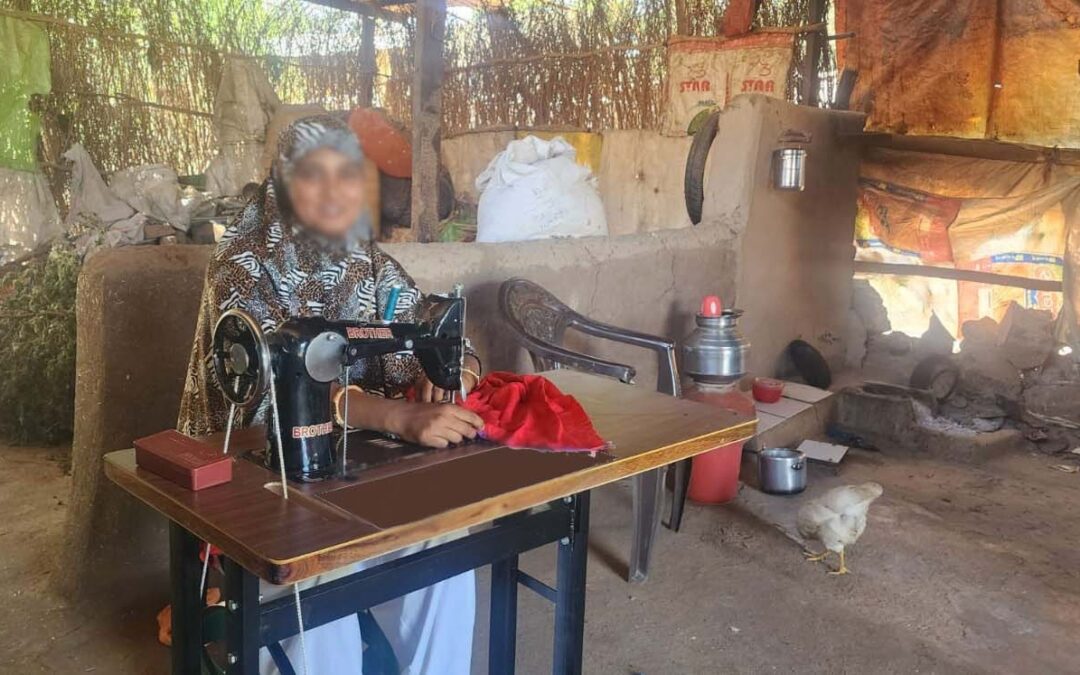Gift sewing machines to empower women and students, eradicating rural poverty and fostering self-reliance.
Empowerment of women, as described in the National Policy of Empowerment of Women 2002, takes economic empowerment and social empowerment as its basic parameters. Economic empowerment includes poverty eradication and income generation, and social empowerment includes education, health, nutrition, etc. Educational attainment, access to employment, and the gender gap is highest amongst all major communities in India.
Muslims are overwhelmingly self-employed (engaged in home-based work). Sewing, embroidery, Zari work, chikan work, ready-made garments, agarbatti, and beedi rolling are some of the occupations in which Muslim women are concentrated. Their work conditions are characterized by low income, poor work conditions. The distinct pattern of Muslim women’s employment in home-based work is in part due to discrimination in formal employment. In part, it is due to a vicious cycle of poverty, lack of education, lack of technical skills, etc. Muslim women are unable to bargain for better work conditions because much of the work they do is subcontracted. This restriction of mobility restricts their employment opportunities and wages. Indian Muslim women are practically invisible in the country’s workforce. There are approximately 70 million educated Muslim women in the country. Given that India’s female labor force participation rate (LFPR) is falling, bringing educated Muslim women into the workforce could, according to one study, account for approximately USD 770 billion of the country’s GDP. Unfortunately, Indian Muslim women face the double disadvantage of being female and Muslim. Muslim girls suffer the worst treatment in India because of social biases & prejudices. Mostly, they spend their lives at home looking after younger siblings or doing home chores, and they do not complete their education. They often leave school during the primary education cycle. Therefore, illiteracy, unemployment, and poverty are extremely high among them. Six years back, the gap between Muslims and Dalits stood at 1 percentage point. Today, it has grown to an alarming 4 percentage points. Muslim women have the lowest literacy rates, at 50.1 percent (in comparison with Hindu women, at 53.2 percent, and Christian women, at 76.2 percent).
Jamia Akkalkuwa offers a 3-year course to needy girls with boarding facilities. It strives to provide a set of sewing machines with some inspirational books to those who complete it. So that they can keep their sewing skills, earn some money, and support their impoverished families. The graduated girls continue their regular higher education from their homes after Mominah course and do stitching as a part-time job. The sewing machines will enable them to help their families and themselves for a long time. Mominah is a module-based course, girl students complete their primary cycle of regular education along with sewing and computer skills. This year, 600 girls completed their education at the 32 girl education center of Jamia. Jamia conducted tailoring classes to make them enabled, empowered, and self-reliant. Now, they are well trained and qualified as seamstresses and are able to make dresses to sell for a small profit and get jobs in the market. Learning the tailoring skills enables them to work from home, set up their own businesses, work in the local market, seek work in the industry, and acquire financial independence. Tailoring increases the respect given to women and adolescent girls by their families and others in their villages.
The proposed project will distribute 300 sewing machines among 150 girls who have completed the 3-year Mominah course and 150 poor potential single mothers, especially widows, who are unable to purchase sewing machines in the villages of India.
The project will enhance the vocational skills of selected women and adolescent girls, who will come from economically backward areas and weaker sections of society. Additionally, it will also improve their entrepreneurship and employment skills.
Jamia, through this project, is striving to make women & adolescent students self-reliant, to restore their dignity, and to empower them. The project will provide income generating opportunities at their home or a nearby home, maintaining the smooth functioning of family institutions. It will also improve women’s standards of living, their roles, work participation, and contributions to their families & country as well. They will be zakat eligible, you can give them their zakat.
Therefore, you are requested to donate a sewing machine set for a adolescent girl student & helpless woman.

